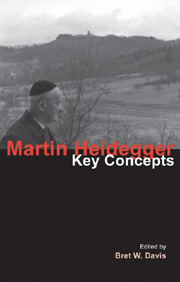Book contents
- Frontmatter
- Contents
- Contributors
- Acknowledgements
- Abbreviations
- Introduction: key concepts in Heidegger's thinking of being
- 1 Hermeneutics of facticity
- 2 Phenomenology: Heidegger after Husserl and the Greeks
- 3 Dasein as being-in-the-world
- 4 Care and authenticity
- 5 Being and time
- 6 The turn
- 7 Heidegger, National Socialism and the German People
- 8 Truth as alētheia and the clearing of beyng
- 9 The work of art
- 10 Ereignis: the event of appropriation
- 11 The history of being
- 12 Will and Gelassenheit
- 13 Ge-stell: enframing as the essence of technology
- 14 Language and poetry
- 15 The fourfold
- 16 Ontotheology and the question of god(s)
- 17 Heidegger on Christianity and divinity: a chronological compendium
- Chronology of Heidegger's life
- Bibliography
- Index
12 - Will and Gelassenheit
- Frontmatter
- Contents
- Contributors
- Acknowledgements
- Abbreviations
- Introduction: key concepts in Heidegger's thinking of being
- 1 Hermeneutics of facticity
- 2 Phenomenology: Heidegger after Husserl and the Greeks
- 3 Dasein as being-in-the-world
- 4 Care and authenticity
- 5 Being and time
- 6 The turn
- 7 Heidegger, National Socialism and the German People
- 8 Truth as alētheia and the clearing of beyng
- 9 The work of art
- 10 Ereignis: the event of appropriation
- 11 The history of being
- 12 Will and Gelassenheit
- 13 Ge-stell: enframing as the essence of technology
- 14 Language and poetry
- 15 The fourfold
- 16 Ontotheology and the question of god(s)
- 17 Heidegger on Christianity and divinity: a chronological compendium
- Chronology of Heidegger's life
- Bibliography
- Index
Summary
The transition out of willing into Gelassenheit is what seems to me to be the genuine difficulty.
(GA 77: 109; see DT 61 = G 33)Introduction: Gelassenheit as authentic non-willing
Gelassenheit, generally translated as “releasement”, is a key word of Heidegger's later thought. Indeed, it names nothing less than the fundamental attunement (Grundstimmung) with which he says human beings are to authentically relate to other beings and to being itself. It contrasts with the fundamental attunement – or rather dis-attunement – of the will. In modern times, human being is essentially will-ful; the will, according to Heidegger, is the historical determination of the essence of modern humanity. In fact he claims that, in the epochs of modernity, the being of beings as such is revealed – albeit in the form of extreme self-concealment and even abandonment – as “will to power” and ultimately as the technological “will to will”.
By way of thoughtfully meditating on this historical determination of being and human being as will, Heidegger looks forward to, and attempts to prepare for, a turn in the history of being and a corresponding turn in the essence of humanity. It is crucial to bear in mind that this turn from will to Gelassenheit would not involve a mere reversal within what Heidegger calls “the domain of the will”, a turnabout, for instance, from will-ful assertion to passive submission. Rather, Heidegger's thought calls for a twisting free of this entire domain of the will and a leap into a region of non-willing letting-be that is otherwise than both will-ful activity and will-less passivity.
- Type
- Chapter
- Information
- Martin HeideggerKey Concepts, pp. 168 - 182Publisher: Acumen PublishingPrint publication year: 2009
- 1
- Cited by

